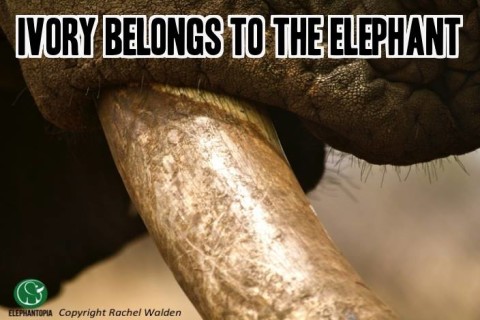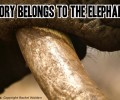Vanishing Species…Vanishing Art
Below is an article from the South China Morning Post. As elephants are becoming a quickly vanishing species due large in part to the illegal ivory trade, so also the art of ivory carving could become extinct. Although we sympathize with Leung Lee-cheong as his livelyhood is based on this ancient art form, we believe that as elephants are in danger of extinction, it’s time for this art form to stop so that this keystone species in Africa can survive the next decade and beyond. (you can read more about my view of music & the ivory trade here)
We definitely vote to keep the SPECIES alive! After you read the article below, be sure to cast your VOTE HERE.
Shared the SCMP news story quoted below from: http://www.scmp.com/news/hong-kong/article/1673953/ivory-carver-fears-destruction-traditional-chinese-culture-attention
Leung Lee-cheong is not your typical local craftsman. Master of a dying trade and holder of one of just a few hundred licences to possess and sell ivory in the city, he also claims to be the owner of some 50 to 60kg of finely crafted ivory and mammoth tusks “worth millions”.
But his proud possessions, most of them sitting in his home, have now become his biggest headache as public pressure ramps up for a complete wipeout of the ivory trade in Hong Kong.
He was given a scare when the government said it would consider making a list of the city’s licence-to-possess holders public. The idea has now been scrapped due to personal data privacy concerns.
He said having to disclose information about himself could put him at the mercy of conservation groups, vehemently lobbying for a complete ban on ivory sales to help curb illegal elephant poaching in Africa, and greater public scrutiny, which would ultimately affect his business.
Leung makes his living selling his works - which now mainly comprises bamboo, wood and bone carvings - to licensed arts and crafts stores around Hong Kong, including those on Hollywood Road. He has a son with no interest in inheriting his craft.
“It will kill us, having to declare who we sell to. I’m pretty sure nobody will buy any more and if they do, they will probably demand very low prices,” Leung, 75, told the Post in his poorly lit, poorly ventilated shoebox-sized workshop.
Under the Protection of Endangered Species of Animals and Plants Ordinance, possession of elephant ivory for commercial purposes requires a HK$160 licence, which is effective for five years.
Leung says all he wants to do is sell his remaining ivory stocks and move on with his life as a craftsman. Not only is the raw material supply for ivory carving no longer there, he says the market in Hong Kong is “next to obsolete”.
Although Leung admits that his works are now more a curse than a blessing, he says a total ban on the ivory trade in Hong Kong is unreasonable.
“All our licensed stocks are legal and should be allowed to continue to be sold. This is traditional Chinese culture and a craft and none of it is exported any more,” said Leung. “All this raw material was bought with hard-earned money. This is my livelihood. [Banning the trade] will be akin to freezing a bank account.”
Leung said he was “against poaching” but linking the trade in Hong Kong with promoting poaching in Africa was “just illogical”. “The method is cruel and I’m against it … but banning the trade here will not have any impact on [poaching] in Africa,” he said.
Leung added he does not want to see an expansion of the illegal trade any more than environmental groups do.
“All we want to do is continue selling our remaining stock … and preserve an art,” he said.
Leung stresses that it is already hard enough to be a licence to possess holder in Hong Kong as each year they must declare how much in weight they sell - “even the scraps”.
This was put in place to regulate the local trade after a ban on international trade 25 years ago. As of 2013, there were 447 licence holders for ivory and the quantity of registered ivory stock stood at 117.1 tonnes.
Leung argues that ivory carving should be preserved as a local cultural and heritage treasure. Though cities like New York, for example, have bans on the local ivory trade, Leung says they have “never been traditional hubs for ivory carving” like Hong Kong.
Leung entered the trade as an apprentice carver when he was just 14. He said that there were about 6,000 to 8,000 carvers working in the 1960s and 1970s.
Craftsmen like Leung would procure raw ivory tusks from factories based on weight and carve out their own designs to sell.
The most basic mass-produced designs were ivory spheres, flowers and animals. The biggest market at the time was Japan.
By the early 1980s, many of the factories had made enough money from the trade and either cashed out or switched industries, leaving individuals like Leung to find their own niche.
Leung said he built his reputation by carving intricate “mountain and water” landscapes. He claims to be one of the last master carvers left in Hong Kong.
“I can confidently say I am one of the few craftsmen able to carve landscapes. You can no longer find this craft in Hong Kong,” he said.
While Leung directs some anger at the government, he reserves the majority of his frustration for green groups and “attention-seeking lawmakers”
Shared from the SMCP story shared below quoted from: http://www.scmp.com/news/hong-kong/article/1673953/ivory-carver-fears-destruction-traditional-chinese-culture-attention
“The Hong Kong government only decided to burn its stock because of security issues and high costs. There’s no point leaving the stock around. Who are you going to get to carve it?”
He pleads for the government to give carvers a chance to sell their remaining stocks or at least help them promote it as an art
The Agriculture, Fisheries and Conservation Department said a ban on sales was unnecessary as the current regulatory and licensing system was effective.
But conservationist Alex Hofford said the city had had 25 years to get rid of its stock and it was time to ban the trade for good.
For now, Leung still has a fighting chance. The government has repeatedly brushed off demands by activist groups to shut its ivory market completely.
“If the government doesn’t help us then we will just vanish without a trace,” he said.








The sale of all products from endangered species must be banned in all countries, and the ban must be enforced diligently, with harsh sentences for anyone caught flouting the ban. China is certainly rich enough to compensate tradesmen for their confiscated stocks.